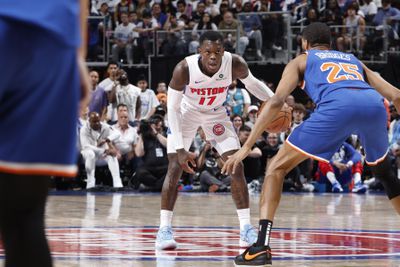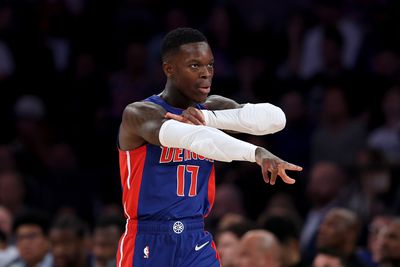
Is he too good to let walk or too much of a luxury for a team counting on a significant role for Jaden Ivey next season?
With the summer fast approaching, the Detroit Pistons are faced with their most fascinating offseason in many years. Detroit will have legitimate expectations coming into a season for the first time in nearly two decades. Aside from potential trade rumors, all eyes will be on looming decisions with Detroit’s veteran free agents, most notably Malik Beasely, Tim Hardaway Jr, and Dennis Schröder.
Schröder, in particular, is a unique dilemma for the organization given his impact and potential fit with a fully intact roster. As the team’s key trade deadline acquisition, he played a huge role in Detroit’s late-season success. He played even better in Detroit’s subsequent playoff matchup against the New York Knicks as one of the most reliable sources of non-Cade Cunningham offense and perimeter defense. Early reports suggest that the team has an interest in a reunion with the 31-year-old journeyman.
Admittedly, I am not a salary cap expert. So, for the purposes of this exercise, let’s assume that the organization and guard were to agree on a contract that makes financial sense for both sides. With that in mind, we’ll focus on the potential on-court benefits and drawbacks of bringing back Schröder. He was a terrific backup point guard for a Pistons team that was lacking in that skillset following the injury to Jaden Ivey. Of course, Ivey is expected to be healthy next season and play a significant role on the team. Therein lies the Schröder dilemma.

Photo by Brian Sevald/NBAE via Getty Images
The Case For
Schröder’s impact on the team’s steady ascent last season was profound. He played many different roles for the Pistons after coming over at the deadline, and played them all to near perfection. He kept the team afloat down the stretch as its primary facilitator during Cade Cunningham’s injury-related absence. He served as a motor to the second unit, living in the paint while creating shots for key pieces such as Beasely, Isaiah Stewart, and Ron Holland. Furthermore, the German guard proved capable of playing alongside Cunningham, allowing the Pistons star to play off the ball more frequently and subsequently relieving some of the offensive load in crunch time.
While all of the aforementioned attributes are great, perhaps his greatest impact is his defense. Schröder is an absolute pest who is willing to pick up ball handlers 94 feet and irritate the hell out of opposing guards and wings. He bolsters the team’s defense in a real way, and is another body to throw at the other team’s best perimeter player in addition to Ausar Thompson and Ron Holland. This also relieves Detroit’s high usage offensive players from needing to guard players who are at the top of the scouting report. Simply put, Schröder fills a lot of gaps that allow the team to function at peak levels.
Lastly, Dennis Schröder is a perfect cultural fit in the organization and city, as his playing style quickly endeared him to his teammates and fans alike. His hard-nosed defense and propensity for mixing it up are not unlike many key role players from great Pistons iterations of the past. I am of the belief that any team that is serious about contending needs a guy like Schröder on their roster. He is a player who not only embraces their role, but is fearless, seeks confrontation, and has a screw loose in the best possible way. These players are hard to find, as they impact winning at a high level, even in a smaller role.
Simply put, Schröder can tilt games with his energy and intangibles alone. And it doesn’t hurt that the veteran brings loads of playoff experience to a team whose core is still all below the age of 25. That impact was especially felt in the playoffs, where you could make the case that Schröder was the team’s most consistent player besides Cunningham. He was clearly unafraid of the moment and delivered routinely when called upon. Even with another year of development and experience for the youngsters, a steady hand who has been there and done that would be an obvious boost to the rotation. Bringing him back would likely give the organization a greater chance to continue to be competitive now.

Photo by Sarah Stier/Getty Images
The Case Against
Speaking of the rotation, Schröder’s fit into a fully healthy one is where things become less certain. When the team acquired him, Jaden Ivey was still out with a broken fibula, making Schröder’s fit seamless as he slid right into Marcus Sasser’s minutes and served as the team’s backup point guard. With a healthy Ivey expected to be in the fold when training camp starts, identifying Schröder’s exact role becomes murky.
At his best, Ivey can and should serve as a secondary creator alongside Cunninham. Furthermore, when the Pistons star sits, Ivey’s skillset is best suited to be the primary on-ball creator with the second unit, as he was prior to being injured. This type of role accentuates the Purdue product’s skillset, as he can get to the rim at will and has shown above-average passing and creativity (despite his sloppiness with the ball). That becomes a problem with Schröder in the mix, as there is a lot of overlap with their skills. If Ivey is slotted for on-ball reps with the second unit, then his backcourt mate ideally would need to be able to space the floor. Though Schröder’s career clip from deep is only slightly below league average, he is a streaky shooter who does not consistently draw hard closeouts. This lack of spacing would allow defenders to routinely cheat over to help on Ivey drives, thus causing spacing issues and bogging down the offense. With a possible extension for Ivey on the horizon, how can Detroit not afford to put the best possible spacing and complementary pieces around him to see how he impacts winning at his best? If Schröder cannot play effectively alongside Ivey, then his avenues for seeing the court become extremely limited when the roster is fully healthy. And though their minutes were successful this year together, his lack of spacing presents a similar issue alongside Cunningham in the long term.
While he is less important than Ivey, Marcus Sasser has been a player that the previous front office regime was high on and invested a lot of resources in. Going into his third year, how does he factor into the equation?
In limited opportunities, he has been highly efficient from 3, and proved capable of bringing instant offense off the bench. While his defense is far from the level of Schröder’s, he competes on that end. Overall, he has stepped in when needed, but the jury is still out on whether or not he’s a long-term piece. Does Detroit want to figure out the answer this coming season? Resigning Schröder would make his path to playing time harder than it already is.
If internal development is truly Detroit’s priority, and by all accounts it is at this point, then Schröder’s presence makes it tougher for the organization to provide ample opportunities to evaluate its young guards. In an ideal world, it would be great to bring him back as an insurance policy for Ivey and/or Sasser. But after playing on 3 teams last season, coupled with his stellar postseason performance, one would think that Schröder will be looking to find a home this offseason. It would also be unlikely that he agrees to a role that does not guarantee him playing time. The case against bringing him back would be to let Ivey and Sasser sink or swim, and combine the salary slots previously allotted for Schröder and Hardaway Jr. to bring in a 3 and D type player who would better complement the offensive skill sets of the team’s young backcourt.
Do you think the Pistons are best served retaining Schröder? If not, how would you like to see the team spend its resources elsewhere?
